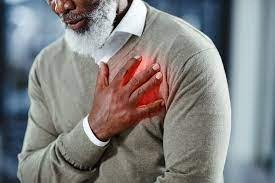Visit a doctor right away since these symptoms indicate that there is a cardiac condition
It’s important to pay careful attention to warning indications that might point to a possible issue when it comes to concerns of the heart. Your heart is a crucial organ, and spotting problems early may save lives. In this post, we’ll discuss numerous heart-related symptoms, when seeking medical advice is absolutely necessary, and how to recognize them.
1. Chest pain is a traditional red flag.
The most well-known sign of heart disease is often chest discomfort. It may feel like a dull soreness, pressure, squeezing, or a strong stabbing feeling, among other things.
2. Difficulty breathing or shortness of breath
Even during little exercise or even at rest, it may be a sign of heart disease if you find it difficult to catch your breath.
3. Palpitations and an irregular heartbeat
It is important to get medical attention if you feel your heart racing or have irregular heartbeats. It may indicate an arrhythmia, which necessitates a medical assessment.
4. Unexplained Tiredness and Fatigue
The inability of your heart to pump blood effectively may be the cause of persistent weariness that doesn’t go away with rest.
5. Edema or swelling
When the heart isn’t pumping blood efficiently, fluid retention may result in swelling in the legs, ankles, feet, or belly.
6. Lightheadedness and Dizziness
Frequent episodes of dizziness or lightheadedness may be a sign of poor blood supply to the brain, which is connected to cardiac problems.
7. Sweaty Cold
Cold sweats that come on suddenly should not be disregarded since they may be signs of a cardiac condition, particularly if they are accompanied by other symptoms.
8. Neck, jaw, or upper back pain
Particularly in women, unexplained discomfort in the neck, jaw, or upper back may indicate cardiac problems.
9. Vomiting and Nausea
Heart problems may be related to persistent nausea or vomiting, which often occurs for no apparent cause.
10. Stomachache or heartburn
Chronic heartburn or indigestion that doesn’t go away with medicine or dietary modifications may indicate a cardiac condition.
11. Quickly gaining weight
Fluid retention resulting from cardiac problems might be the cause of sudden and unexpected weight gain.
12. Blue fingernails or lips
Lips or fingernails that have a blue color might indicate inadequate oxygen circulation, which may be connected to cardiac problems.
13. Prolonged Cough
A persistent cough, particularly one that produces pink or white mucus, may be an indication of heart failure.
14. Pain in the chest during exercising
It’s important to get medical help if you develop chest pain or discomfort when exercising or engaging in other physical activities.
15. Family background
Your risk is up if your family has a history of heart disease. If heart disease runs in your family, regular check-ups are essential.
16. Hypertension and cholesterol
Your heart may experience strain from high blood pressure and cholesterol levels. Regular management and monitoring are essential.
17. Diabetic
Heart disease risk may be considerably raised by diabetes. It’s crucial to manage properly and get your heart examined.
18. Using tobacco and smoking
Major risk factors for cardiac issues include smoking and consuming tobacco products. Quitting smoking may greatly enhance heart health.
Obesity 19.
Obesity or being overweight may put stress on your heart. Heart health depends on maintaining a healthy weight.
Stress and mental well-being 20
Your heart health may be impacted by persistent stress and untreated mental health issues. Getting help is essential. The condition of your heart is crucial, to sum up. It’s crucial to seek medical advice right away if you or a loved one exhibits any of these signs or has heart disease risk factors. Early intervention and lifestyle modifications may significantly impact how cardiac diseases are managed and how well-being is generally improved.







